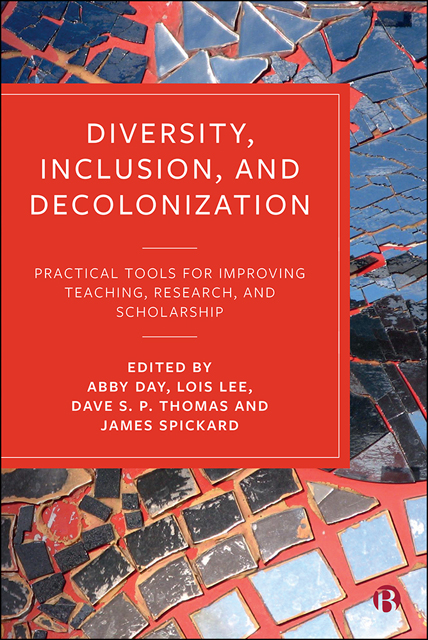 Diversity, Inclusion, and Decolonization
Diversity, Inclusion, and Decolonization Book contents
- Frontmatter
- Contents
- List of Figures and Tables
- Notes on Contributors
- Acknowledgements
- Typographical Note
- Introduction: Why Diversity, Inclusion, and Decolonization Matter
- Part I Changing Universities
- Part II Diversifying Curricula
- Part III Diversifying Research and Scholarship
- Part IV Overcoming Intellectual Colonialism
- Epilogue: What We Have Learned
- Index
12 - Scholarship in a Globalized World: The Publishing Ecosystem and Alternatives to the Oligopoly
Published online by Cambridge University Press: 13 October 2022
- Frontmatter
- Contents
- List of Figures and Tables
- Notes on Contributors
- Acknowledgements
- Typographical Note
- Introduction: Why Diversity, Inclusion, and Decolonization Matter
- Part I Changing Universities
- Part II Diversifying Curricula
- Part III Diversifying Research and Scholarship
- Part IV Overcoming Intellectual Colonialism
- Epilogue: What We Have Learned
- Index
Summary
As the world reckons with racial and other systemic injustices, so too must academics reckon with publishing injustices. This must start with a recognition that our books, textbooks, and articles are now more commodities than they are intellectual achievements. It also begins with a recognition that scholars’ reactions to that statement will depend on their scholarly positions and privileges.
Scholarly publishing is a multibillion-dollar industry run by multinational corporations (Johnson et al, 2018, p 22). This alone should warn scholars of the need to critically examine the parties and practices involved and their impacts on people. The financial strength of scholarly publishing stems from its corporate control of what counts as scholarly excellence. What was once the scholar’s domain has become a pawn of commerce and competition. This transfer of responsibility has produced a complex web of economic, social, legal, and cultural dependencies at the center of which sits the publishing oligopoly.
Scholars, devoting surprisingly little attention to this displacement, may be unaware of the ways that various scholar communities are subjected to oligopolistic powers. Even activist scholars and justice-oriented disciplines reinforce power asymmetries with their silence on the matter. Only by confronting these power asymmetries and scholars’ relationships with publishing can readers dismantle the oligopoly and rebuild a more just publishing ecosystem.
Publishing as an arm for profit
Scholarly publishing began in the 17th century; however, only in the 20th century did it become massively profitable. After the Second World War, enrollments in higher education grew across the world. Populations rose, families migrated to urban centers, and marginalized communities – including women and those previously under colonial rule – sought opportunities in the growing knowledge economies (Altbach et al, 2009, pp 80– 86, 98– 104; Fabricant and Brier, 2016, p 45; Fyfe et al, 2017, p 7). As the student bodies grew, so too did the size of the faculty, which prompted more specialization, professionalization, and expectations to publish (Fabricant and Brier, 2016, p 44; Fyfe et al, 2017, p 7). Sustained investments in higher education and growth in publishing revealed the publishing market’s potential. This changed both the publishing business and its business strategies (Fyfe et al, 2017).
- Type
- Chapter
- Information
- Diversity, Inclusion, and DecolonizationPractical Tools for Improving Teaching, Research, and Scholarship, pp. 186 - 202Publisher: Bristol University PressPrint publication year: 2022
